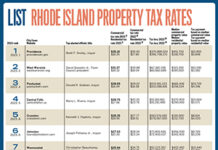Some businesspeople might feel there’s an economic downturn looming ahead, but Thomas Tzitzouris doesn’t see it that way.
“There is no reason to suspect there will be a recession in the U.S. anytime soon,” Tzitzouris, a Rhode Island native and a director for Strategas Research Partners in New York, told those in attend at the Providence Business News Economic Trends Summit at the Crowne Plaza Providence-Warwick on Feb. 13.
The event keynote speaker, Tzitzouris said he is convinced the U.S. will stay out of recession in the near future, but his projections for 2020 were not entirely rosy. While projecting a 2% growth rate in gross national product in 2020, he said the year appears to have gotten off to a sluggish start. At the same time, he sees more robust growth coming in the third and fourth quarters.
The economy’s first-quarter performance, he said, will be dampened by 737 MAX troubles at aircraft manufacturer Boeing Co., lingering effects on business confidence despite a trade war truce with China, and concern about supply-chain disruption in China because of the coronavirus outbreak.
Tzitzouris said the spread of the coronavirus should begin to slow by March, although he said the possibility of the virus worsening, forcing China to enact even more stringent quarantine measures, is a “wild card” in trying to determine the economic future.
‘This could be a period in which Main Street outperforms Wall Street.’
THOMAS TZITZOURIS, Strategas Research Partners director
But assuming the outbreak slows, and the preliminary trade agreement with China bears fruit, Tzitzouris said pent-up demand should fire up the economy toward the end of the year. And he sees the possibility of serious expansion in housing by the third quarter of 2020.
But the stock market, he said, will not rise much higher, and he sees the possibility of what he calls a “down leg” of about 10% at some point during the year. “Everything is rich right now,” he said.
Short-term economic growth, he said, is more likely to be fueled by consumer spending than the stock market.
“This could be a period in which Main Street outperforms Wall Street,” he said.
But Tzitzouris believes the Federal Reserve will keep interest rates low to avert a recession. “Economies don’t die of old age,” he said. “They get murdered, and usually the killer is the Fed.”
Although U.S. unemployment is low, Tzitzouris pointed to some soft spots in the labor economy. He said neither wage increases nor productivity are growing as fast as they should. The reason, he said, is a lack of business spending, and that is due to a lack of business confidence.
Why aren’t business leaders confident?
Tzitzouris said it is because business leaders fear government interference, whether in the form of trade wars, higher taxes, or regulatory changes. “We’re not spending because we don’t know what the rules are going to be,” he said.
Tzitzouris grew up in Smithfield, earned a finance degree from Bryant University and commutes to New York from his home in North Kingstown. One of his early memories dates to Jan. 1, 1991, when the collapse of a privately run insurer for small Rhode Island financial institutions forced then-R.I. Gov. Bruce Sundlun to close 45 credit unions and banks, which created serious hardship for the Tzitzouris family.
His forecast for Rhode Island is that the state will continue to enjoy the benefits of the national economy, although the Ocean State job market is unlikely to outpace either its neighboring states or the country as a whole.
Tzitzouris called himself a believer in free markets, and said business suffers when government fails to respect either human rights, or property rights. Rhode Island has a generally positive record when it comes to human rights, he said, but a much weaker one with property rights.












